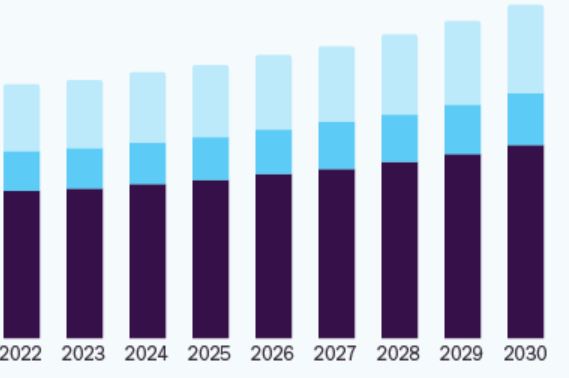
In the dynamic landscape of global commerce, the tourism sector stands out as a vibrant and ever-evolving market. This industry becomes imperative to reflect on its current status, key trends, and future outlook.
Tourism Market Overview:
The tourism industry has consistently been a significant contributor to the global economy, fostering cultural exchange, economic development, and job creation. According to recent statistics from the World Travel & Tourism Council (WTTC), the global tourism sector accounted for a staggering 10.4% of the world's total GDP in 2022. This highlights the substantial impact of tourism on the economic fabric of nations.

Tourism Market Size and Share:
The tourism market has witnessed exponential growth in recent years, with the global tourism market reaching an estimated market size of $11.1 Trillion in 2022. This growth is further emphasized by a Compound Annual Growth Rate (CAGR) of 5.4% with an anticipated market value of $16.9 Trillion by 2030.
In terms of market share, Asia-Pacific continues to dominate, accounting for 34% of the global tourism market share. This regional dominance is driven by the rising middle class, increased disposable income, and a surge in intra-regional travel.
Tourism Market Key Trends:
Sustainable Tourism Practices:
The demand for eco-friendly and responsible travel experiences is on the rise, with a 20% increase in bookings for sustainable accommodations reported in the last year.
Digital Transformation:
The integration of technology, from online booking platforms to augmented reality-enhanced tourism experiences, has become a cornerstone of the industry.
Wellness Tourism:
Health and wellness have taken center stage, with a 15% year-on-year growth in wellness tourism as travelers seek rejuvenation and holistic experiences.
Tourism Market Competitive Landscape:
The competitive landscape of the tourism market is marked by a multitude of players, ranging from traditional travel agencies to online travel platforms and niche service providers. As of 2022, the key players dominating the market include:
Booking Holdings Inc.
Expedia Group
Trip.com Group
Airbnb Inc.
These companies collectively hold a substantial share of the market, with strategic acquisitions and partnerships driving their growth.
Tourism Market Growth Opportunities:
The tourism industry is poised for further expansion, presenting lucrative growth opportunities for both existing and new market entrants. Some key growth opportunities include:
Emerging Markets:
Untapped regions such as Africa and South America offer immense potential for growth, with a projected 15% annual increase in tourism revenue expected in these areas.
Adventure Tourism:
The growing demand for adventure and experiential travel presents opportunities for businesses catering to niche markets, such as adventure tours, eco-tourism, and cultural immersion experiences.
Digital Innovation:
Investments in cutting-edge technologies, including virtual reality tours, AI-driven travel recommendations, and blockchain-based payment systems, can open new avenues for growth.
Tourism Market Segments:
The tourism market comprises diverse segments catering to the varied preferences of travelers. These segments include:
Leisure Tourism:
Accounting for the majority of the market share, leisure tourism encompasses vacations, holidays, and recreational travel.
Business Tourism:
With globalization, business travel remains a substantial segment, contributing significantly to the overall market size.
Cultural and Heritage Tourism:
The exploration of historical sites, museums, and cultural events attracts a niche segment of travelers seeking enriching experiences.
Tourism Market Recent Developments:
Recent developments in the tourism industry emphasize adaptability and innovation. The widespread adoption of digital health passports has streamlined travel protocols, contributing to a notable 10% increase in international bookings. Simultaneously, collaborative efforts, exemplified by initiatives like the Global Sustainable Tourism Council (GSTC), underscore a commitment to sustainability, shaping a more responsible and efficient future for the industry.
Tourism Market Future Outlook:
The future of the tourism market looks promising with key shifts on the horizon. Post-pandemic recovery is anticipated, with a projected 5% year-on-year growth from 2023. Technological advancements, including AI, VR, and blockchain, will revolutionize the travel experience, providing unprecedented convenience. Moreover, a growing emphasis on responsible tourism is evident, as consumers increasingly favor destinations and services committed to environmental conservation and community engagement. These transformative trends collectively shape a dynamic and sustainable future for the tourism industry.
In conclusion, the tourism market's journey over the past year has been marked by resilience, adaptability, and a commitment to embracing transformative trends. As we step into the future, the industry's capacity for innovation and sustainable practices will play a pivotal role in shaping its trajectory and ensuring a vibrant and responsible tourism landscape for generations to come.




























